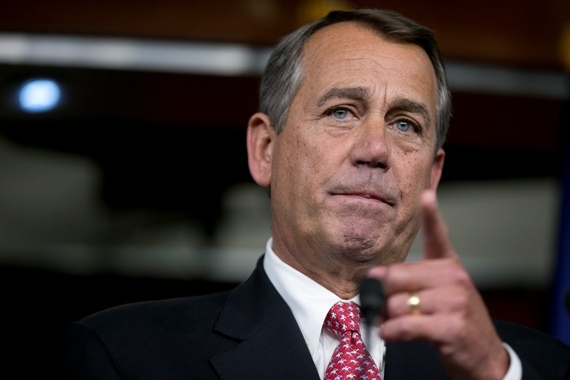“If Boehner can't bring his plan B to a vote and win, he probably won't be able to successfully sell any more comprehensive deal — and we go off the cliff.”
The quote above is from
yesterday's post. As you may have noticed, the world didn't end last night, although it has changed significantly per that quote. Speaker Boehner could not bring his plan B to a vote — he pulled it once it was clear he didn't have the votes — much less pass it, and now the complexion of the negotiations has changed again.
For a while there, it seemed to me that the Democrats were in danger of overreaching. A deal was quite close, Republicans (or at least Speaker Boehner) had made a significant concession in allowing some tax-rate increases, and Democrats' intransigence on needed spending cuts that crashed a deal would have allowed the Republicans to argue persuasively that they had done their bit. The Democrats would then be seen as the problem. Boehner's plan B was a politically astute follow-up to that, allowing the Republicans to argue that they really were willing to raise taxes on the real rich, while sparing small business, and that the fiscal cliff was the Democrats' fault.
The collapse of the plan B legislation, without even a vote, torpedoes that narrative. In fact, Democrats can now say that the talks collapsed because Republicans would rather go over the cliff than raise taxes on people making more than a million per year. That will be a tough argument for the Republicans to counter, because at least the second part of it is true.
If I were John Boehner, and I'm glad I am not, I would be weighing the following decision: Do I try to cut a deal with the Democrats — remember, the two sides are actually quite close now—and get an agreement that will pass the House with Democrats and a portion of the Republicans? Or do I side with the conservatives in my party who sank the plan B vote and pull the Republicans as a whole out of the negotiating process?The first choice could still conceivably lead to a deal. The second choice probably means we go over the cliff.
Signs seem to indicate that Boehner is pulling the plug. He unexpectedly adjourned the House until after Christmas and was quoted as saying, “Now it is up to the President to work with Senator Reid on legislation to avert the fiscal cliff.” In other words, the Republicans are done.
I think the betting now has to be that there won't be a budget agreement, and the tax increases and spending cuts start on January 1 — that is, we go over the cliff. While a deal is certainly possible, the Republicans' collective unwillingness to raise taxes, combined with the equal, but so far less visible, unwillingness of the Democrats to cut spending, makes that the less likely option. Markets seem to agree, as they've gotten whacked this morning as I write this.
The fiscal cliff is bad enough, but what worries me most is what this failure portends for the upcoming debt ceiling negotiations. As the face of the Republican Party, Boehner seems to be willing to negotiate and compromise. He's up for reelection to the Speakership in January, and this most recent embarrassment puts that in some question, in my opinion. If the White House can't cut a deal with Boehner, I suspect it will have an even tougher time with his successor.
Brad McMillan is the vice president and chief investment officer for Commonwealth Financial Network LLP. This commentary originally appeared on the firm's website.







